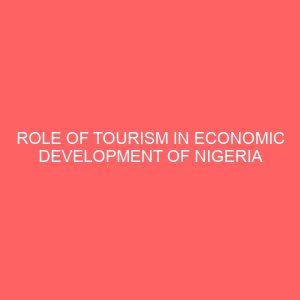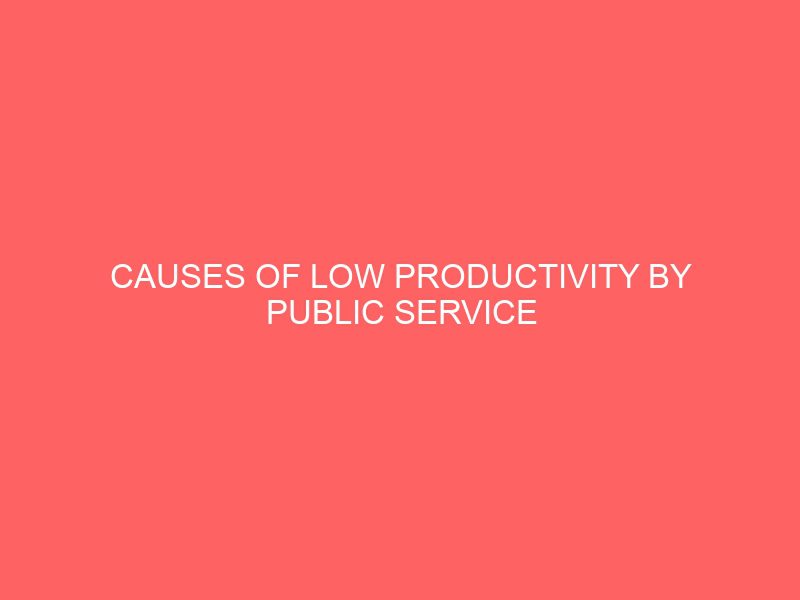Description
CHAPTER ONE
1.0 INTRODUCTION
1.1 BACKGROUND OF THE STUDY:
This project is on Causes of low productivity by Public Service Workers. A case study of the National Electric Power Authority. Productivity is very vital for the development of any country because it will help to improve the standard and quality of life of the citizens. The issue of low productivity by public service workers have in recent time been a matter of great concern to the nation.
Let us first of all define the term or rather make an attempt to the definition of productivity.
Productivity simply means the rate or efficiency of work especially in industrial production. Therefore, low productivity is simply the slow rate and inefficiency of work in production. Increased productivity will help to improve the conditions of the environment as well as enhance security. This is why David Ricado stated in his study of population “that food needs to grow at a geometrical rate in order to meet the demand of the growing population. This emphasizes the need for increased productivity.
Yesufu T. M. (1962) was of the view that productivity can be defined as the ratio between output and all the resources used in production, i.e. capital, labor, raw materials etc. The problem of raising output is one of making the most efficient use of all available resources. With these definitions, one may ask Why is the Nigerian Public Service workers inherently characterized by low productivity in spite all government’s efforts to improve productivity?
Increasing productivity is a way of increasing the ability of people to do what they want to do as such that it can provide the wherewithal for achieving a higher standard of living for those suffering from low income and inversely boosting the prosperity of the overall Nigerian economy.
1.2 STATEMENT OF PROBLEM:
There have been concerned efforts by the government and the organized private sector to enhance productivity in Nigeria. For instance, the Federal or State Government organizes seminars and workshops aimed at making its personnel to increase productivity. We also have the National Productivity Centre and the Federal Government gives merit award to individuals who have distinguished themselves in terms of being highly productive. But in spite of all the efforts being made, the public sector is still experiencing low or decreasing productivity.
Especially in the Public Service today, there is relatively low level of productivity as most of the personnel are not putting in their best; some are idle, others come late to work and still others are absent from work without permission. There is general laxity amongst workers who believe that government work is nobody’s work.
Nigerians cannot withstand the competition in the world market; this is also attributable to low productivity especially in the public sectors. In other countries, their level of technology is very high thereby enhancing their level of productivity which puts them in a favourable position in international market.
This study will therefore provide answers to questions like – the causes of low productivity in the public sector of the Nigerian economy using NEPA, Enugu North Local Government Area as the case study.
1.3 OBJECTIVES OF THE STUDY:
In view of the fact that the issue of low productivity has become a matter of great concern to the various sectors of the Nigerian economy, against this backdrop, the objectives of this study are aimed at finding out:
- Why productivity is low in the public sector
- The roles of motivation in productivity
- Also the management problems that causes inefficiency and low productivity of workers.
1.4 RESEARCH QUESTIONS:
In pursuance of this study, the following research questions were considered relevant. Though the research questions were formulated based on the objectives of the study;
- What are the ways or means through which the management of NEPA motivates their workers?
- How does motivation relate to productivity in an organization?
- What are the relevance of motivation in the management of public organizations (NEPA)?
- How does motivation serve as a management tool for increasing productivity?
- What are the management problems that cause inefficiency and low productivity of workers?
1.5 SCOPE OF THE STUDY
According to Osuala (1985:27) “an adequate statement of the problem also defines it very carefully in terms of its scope, and it is obvious for a researcher to set forth the bounds of the topic being researched on”.
Based on this, the scope of this study covered the National Electric Power Authority (NEPA) within Enugu North Local Government Area.
1.6 LIMITATION OF THE STUDY
A study of this nature cannot be completed successfully without the researchers encountering some major constraints. Against this backdrop, one of the major constraints of this study was inadequate time.
Another limitation to this study was inadequate fund, which would have marred the efforts of the researchers.
Moreover, a major limitation to this study was the uncooperative attitude of some of the respondents (ie the workers) from the organization under study especially as it concerned the completion of the copies of questionnaire administered to them.
1.7 SIGNIFICANCE OF THE STUDY
This study would be of immense benefit to the government and the management of public organizations especially those who are indifferent to the plights of the workers, since the study through the recommendations provided solutions and suggestions through which workers could be gingered for greater performance. A major significance of this study is that it will serve as another contribution to the academic development of the theories of productivity.
1.8 HISTORICAL BACKGROUND OF ENUGU NORTH LOCAL GOVERNMENT
Enugu North Local Government Area was formed in 1991 after the creation of Enugu State. This Local Government was carved out from the then Enugu Local Government which was a premier Local government Area in the former Anambra State.
Enugu North Local Government is bounded on three sides by three Local Government Areas. These Local Government Areas are: Enugu South Local Government in the South, Enugu East Local Government in the East and Udi Local Government on the Western side of Enugu North Local Government Area.
Within Enugu North, there exist four notable markets, these markets are:
- The famous Ogbete Main Market, which is the biggest market in Enugu State. It is sighted within the nerve center of Enugu North Local Government.
- Aria Market which is situated between the Iva-Valley Coal Mine and Enugu Gold course.
- Enugu Industrial Market at Coal Camp where motor parts are sold and manufactured.
- The New Haven Ultra Modern Market, Enugu.
Enugu North Local Government has three tertiary institutions located within its locality. There are namely:
- University of Nigeria Enugu Campus (UNEC)
- Enugu State University of Science and Technology (ESUT)
iii. The Institute of Management and Technology (IMT), Enugu.
Enugu North is also endowed with some tourist attractions such as: The Modern Amusement Park (Polo Park) with its unique facilities.
- An Art Gallery within the complex of Institute of Management and Technology, Campus II on Okpara Avenue, Enugu.
- The Enugu Zoological garden and
- The National Archives all situated within or very close proximity to each other.
There is also the International Trade Fair Complex, and within this complex is a communication outfit by NITEL for International and Local calls.
Enugu North Local Government has two indigenous communities namely:
- Hill-top Indigenous Community in Enugu-Ngwo and
- Ogui – Nike indigenous community.
1) HILL-TOP INDIGENOUS COMMUNITY IN ENUGU NGWO:
Enugu-Ngwo which is the oldest name since 1915, Pre and Post Colonial naming of the entire urban city had the prefix Enugu-Ngwo attached. Moreso, before 1906 when Coal was discovered and later the mining of Coal, Enugu-Ngwo indigenes were basically farmers who cultivate cassava, vegetables and yam which they market in the open market which is today referred to as Ogbete Main Market.
Enugu-Ngwo people are very welcoming to strangers. Their cultural affinity and behavioural pattern make them homely with strangers from all facets of live. The presentation of all their farm land for use to the Colonial Administration for building of Government Reserve Quarters, recreational centres and office secretariat both for Local, State and Federal Government speak loud of their welcome behaviour, hospitality and how free minded they are:
The Enugu-Ngwo Hill-Top Community tribal/cultural heritages are the same with other communities but with a slight difference. Biennially, Ngwo people celebrate the most exciting carnival in the world known as “ODO FESTIVAL”.
2) OGUI-NIKE INDIGENOUS COMMUNITY:
Ogui-Nike is the Premier Indigenous Community within the Enugu North Local Government Area. It is an autonomous community having its own Traditional Ruler in the person of IGWE ANTHONY OJUKWU, Chinenyeze I of Ogui – Nike.
It is situated virtually in the center of the vast expanding metropolis of Enugu, Ogui-Nike still maintains its uniqueness and customs although it forms part of the large NIKE CLAN.
The Nike clan extends from the Milikin Hill in the West, to Emene in the East and from Ugwuogo in the North to Ogui-Nike in the South.
The place and importance of Ogui-Nike in the Enugu metropolis is preserved by the naming of the longest and most important Road in Enugu as “OGUI ROAD” in addition to the part of Enugu urban known as OGUI TOWNSHIP. The Asata River too which formerly separated the township from the rural village until the emergence of the Independence Layout is also preserved by the ASATA TOWNSHIP in Enugu.
The Presidential road leading to the Independence Layout divides the community into two halves and together with the famous Obiagu Road form the major roads in the town.
During the festive seasons, a visit to these two major roads will witness the display of the culture and traditional ceremonies of the community.
The festive seasons include the “New Yam Festival” which usually takes place between July and August every year, and the “EGWUGWU” Masquerade Festival which is biennial and can take place in March or April.
Christian Festivals of Easter, Christmas and New year are also observed since most of the indigenes are ardent Christians.
The minor market in Ogui-Nike is the “Afia-Nine” where vegetables and crops from the rural areas are brought and sold to the urban dwellers. This market is quite popular as people come from far-away places to obtain these rural farm produce.
Finally, Enugu North Local Government has had several Chairman since its formation, but presently, the name of the current Chairman is Hon. Emma Ugwu, while the name of the Personnel Manager is Barr. Asogwa. Enugu Central was carved out from it and it is called Enugu North Development Centre.
1.9 PROBLEMS HINDERING PRODUCTIVITY IN ENUGU NORTH LOCAL GOVERNMENT AREA:
Many students and known scholars have carried out studies on this issue of low productivity. They have carried out research to find out the real factors responsible for low productivity.
In Enugu North Local Government, various factors were observed as hindering productivity.
Generally, there is this common impression that every Nigerian worker is lazy, slow, sleepy, reluctant to act, unconcerned, and deceitful in their approach.
In the course of this study, the researchers observed the following as some of the problems hindering productivity in Enugu North Local Government:
- POOR EDUCATIONAL BACKGROUND OF WORKERS: Most of the staff in Enugu North Local Government were discovered to be lacking in terms of their educational background, majority of them had the certificates without the basic knowledge, instruction, abilities required of their jobs. Consequently, most of them finds it very difficult to steer the affairs of their various positions thereby creating lapses here and there which should not have been.
- LACK OF TRAINING: As rightly defined by Denyer, J. C. (1975), “training is the adoption or moulding of a pewson to increase his fitness for a specific activity. Training of workers would make them more productive as well as improve their morale, thereby increasing their loyalty and adaptability of their immediate environment.
- ABSENCE OF PARTICIPATIVE MANAGEMENT:
Permit to say here that when there is an absence of participative management, workers would not be productive. Participative management is a decision making process where workers discuss with their supervisors and influence decisions that affect them. It explores the feelings and opinions of workers about their jobs. With the use of participative management, every group is consulted before any change is initiated. Through this system, every worker develops a sense of participation, which results in high productivity.
- POOR COMPENSATION OF WORKERS: Compensation packages are reward for performance. They can be in either cash items such as salary, allowances and Christmas bonus or in non cash items which we call fringe benefits such as giving the Local Government workers some items from the government’s inscripted products such as calendars, cups, wall clocks, etc…
When there is poor compensation of workers, the workers will not put in their best in their jobs thereby causing low productivity.
- WRONG CHOICE IN DELEGATION: Delegation as we know is an organizational process that permits the transfer of authority from a superior to a subordinate to make commitments, use resources and take action in relation to duties assigned to him. No government can function well and effectively without delegation.
Therefore, when wrong people or workers are delegated, this will drastically affect the anticipated results which consequently will be detrimental to the level of productivity.
- THE LEADERSHIP: This is one major problem that will hinder productivity in any government. While conducting this research, it was discovered that workers in Enugu North Local Government finds it a bit difficult with their boss, which is the Chairman.
Most of them complained of him being too authoritative, which is characterized by centralization of authority and decision making in the boss.
Although this type of leader tends to emphasis neither negative nor positive leadership, he motivates his subordinates by forcing them to rely upon him for need satisfaction. As such he takes full authority and responsibility for the work to be done. One may argue that in government, things are different, but no matter the institution or organization, the type of leadership goes a long way to either make or mar the level of productivity of that organization or institution.
- DIFFERENT SALARY SCALES: In Nigeria generally where standard of living vary from area to area, to motivate workers, it is important that an evaluation bearing in mind cost of living, styles and standards of living in different cities in our country is carried out.
In Enugu North, workers know that standard of living vary and that a pay system based on differential living standards would increase the motivation to work.
Also if remuneration is not based on performance as in the case of Civil Service, it will not motivate. But if a worker realizes that if he works hard, he stands to be recognized by paying him extra, then he will be motivated to work there being more productive.
All these and many more are some of the problems found to be hindering productivity in Enugu North Local Government.
1.10 DEFINITION OF TERMS:
- PRODUCTIVITY – Increased efficiency and the rate at which goods are produced.
- WHEREWITHAL – Things required or needed for a purpose.
- LAXITY – Careless or not strict in discipline or morals.
- TECHNOLOGY – Mastery and utilization of manufacturing methods and industrial arts.
- PUBLIC SECTOR – The area of the economy concerned with the government.
- GEOMETRICAL RATE – Series of numbers with a constant ratio between a successful quantities of the numbers which increase by a common multiplier or decrease by a common division.
- ECONOMY – System for the management and use of resources.
- PRODUCTION – The fabrication of a physical object through the use of labour, materials, money and equipment.
- PROTOCOL – Etiquette applying to rank or status, correct procedure.
- REMUNERATION – Pay or reward for services rendered
- MOTIVATION – Causes or reason for the actions of a person, reflection of a person’s desire to fulfill certain needs.
- BIENNIALLY – Happening every second year, or happening once in every two years.
- PROXIMITY – Nearness to each other.








Reviews
There are no reviews yet.